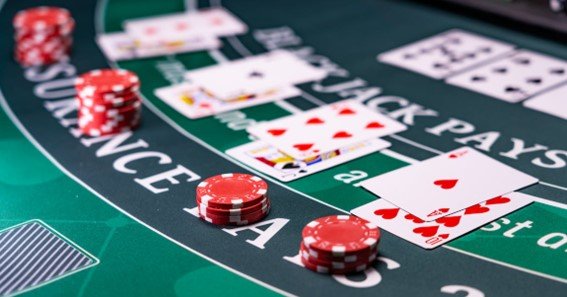When playing blackjack, you might come across the option to take insurance when the dealer shows an ace. But what is insurance on blackjack, and is it worth the risk? Understanding the definition of insurance in blackjack, how it works, and when it’s a good or bad choice can help improve your gameplay and potentially save your bets. This article explains everything you need to know about blackjack insurance, including its pros and cons.
What Is Insurance on Blackjack?
In blackjack, insurance is a side bet that players can make when the dealer’s face-up card is an ace. This bet acts as a form of protection, or “insurance,” against the dealer potentially having a natural blackjack (a total of 21 with their first two cards). The blackjack insurance bet usually costs half of your original wager, and it pays 2:1 if the dealer does indeed have a blackjack. If the dealer does not have blackjack, you lose the insurance bet but continue playing the hand.
How Blackjack Insurance Works
To understand how blackjack insurance works, let’s break it down into steps:
- Dealer Shows an Ace: When the dealer’s face-up card is an ace, players are given the option to take insurance.
- Insurance Bet Placement: If you opt for insurance, you place a bet equal to half of your original wager.
- Checking for Blackjack: If the dealer’s hidden card (face-down card) is a 10, Jack, Queen, or King, the dealer has blackjack, and the insurance bet pays 2:1.
- Outcome of the Bet:
- If the dealer has blackjack: You win the insurance bet, receiving a payout that matches your original wager.
- If the dealer does not have blackjack: You lose the insurance bet, but the hand continues, giving you a chance to win or lose your original bet as normal.
By knowing these blackjack insurance rules, you can better decide whether or not to take insurance on each hand.
Pros and Cons of Blackjack Insurance
While blackjack insurance might seem appealing, it has both advantages and disadvantages that you should consider.
Pros of Taking Blackjack Insurance:
- Risk Mitigation: If you have a strong hand and fear losing to the dealer’s blackjack, insurance can protect your original bet.
- Potential for High Payout: Insurance pays out 2:1, so you get back double your insurance bet if the dealer has blackjack.
- Option for Safe Play: It provides an extra layer of safety in cases where the dealer is likely to have blackjack.
Cons of Taking Blackjack Insurance:
- High House Edge: The odds of winning blackjack insurance are typically low, giving the house a significant advantage.
- Overall Loss Potential: Insurance is considered a risky side bet because you’re essentially betting on one specific outcome – the dealer having a blackjack.
- Not Always Profitable: Statistically, insurance is often a losing proposition for players, as dealers are less likely to have a 10-value card than other cards.
These pros and cons of blackjack insurance highlight the importance of understanding the odds and risks before taking the bet.
When to Take Insurance in Blackjack
While many blackjack experts advise against taking insurance, there are certain situations where it may make sense:
- High Stakes with High Hands: If you have a significant amount at stake and a strong hand, insurance can provide peace of mind.
- Card Counting: If you’re an experienced card counter and can estimate that there are a lot of 10-value cards remaining in the deck, insurance could be a strategic choice.
- Risk Mitigation for Beginners: New players who want to limit their losses in uncertain situations may sometimes find insurance helpful.
For the average player, however, the risk of taking insurance in blackjack often outweighs the benefits, as the house edge is generally unfavorable.
FAQ
1. What is insurance on blackjack?
Insurance on blackjack is a side bet that protects against the dealer having a natural blackjack when their face-up card is an ace.
2. How does blackjack insurance work?
If the dealer shows an ace, you can place an insurance bet for half of your original wager. If the dealer has a blackjack, the insurance bet pays 2:1.
3. Is blackjack insurance a good bet?
In most cases, blackjack insurance is considered a risky bet with a high house edge. However, it can be useful in specific situations, like when counting cards.
4. What are the odds of winning blackjack insurance?
The odds of winning an insurance bet depend on the likelihood of the dealer’s face-down card being a 10, but generally, they favor the house.
5. Should I take insurance in blackjack if I have a strong hand?
Even with a strong hand, insurance isn’t always a good choice because it doesn’t affect the outcome of your main hand and comes with a high risk.
Conclusion
In summary, what is insurance on blackjack? It’s a side bet that allows players to hedge against the dealer’s potential blackjack. While it provides a form of risk mitigation, the odds of winning blackjack insurance are typically low, making it a high-risk option. Understanding when to take insurance in blackjack and weighing the pros and cons can help you make smarter betting choices in the game. For most players, skipping the insurance bet may be the more strategic option, but it ultimately depends on your personal risk tolerance and familiarity with the game’s dynamics.










